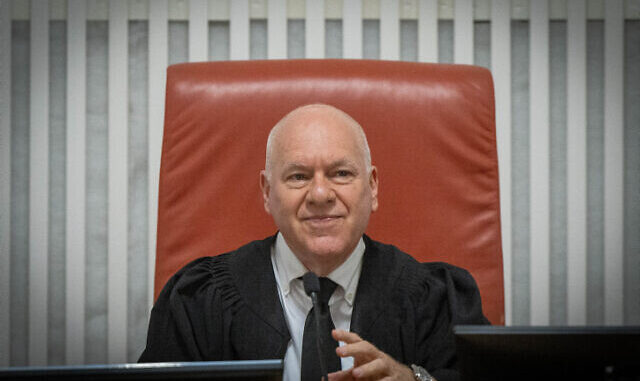Justices imply they’re considering delaying implementation of law that stops court removing premier; Netanyahu’s lawyer calls it ‘unthinkable’ to allow ouster by unelected official
Today, 6:49 pm

President of the Supreme Court Esther Hayut at the Supreme Court in Jerusalem, August 3, 2023. (Yonatan Sindel/Flash90)<
The High Court of Justice asserted on Thursday in no uncertain terms that it views a recently passed law blocking the court from ordering the prime minister to recuse himself as a highly personal piece of legislation, and implied that it is considering an explosive ruling which would delay implementation of the law.
Supreme Court President Esther Hayut quipped that the “fingerprints” of a plan designed to prevent Prime Minister Benjamin Netanyahu from being ordered to recuse himself were “very clear,” while her fellow panel member Justice Uzi Vogelman said simply that “the fact is the law is personal.”
Following the five-hour hearing on Thursday, it was not immediately clear when the court would issue its ruling in the case.
Significantly, the three justices presiding over the hearing asked the petitioners’ attorneys pointedly on several occasions whether this problem could be resolved by delaying implementation of the law — an amendment to Basic Law: the Government — similar to a ruling issued by the court just three days ago against another piece of coalition legislation, the so-called Tiberias law.
Netanyahu’s attorney made a spirited counter-argument however, saying that the law was legitimate and should not be overturned by the court, since it was designed not specifically to benefit Netanyahu but rather to ensure that unelected officials cannot remove an elected prime minister from power.
In another important moment during the hearing, Vogelman insisted that the High Court is fully within its authority to exercise judicial review over Israel’s quasi-constitutional Basic Laws, including the coalition’s recusal law which amends Basic Law: the Government.
Several ministers have in recent days claimed that the High Court has no authority to strike down or amend Basic Laws, including Heritage Minister Amichai Eliyahu — who said the Knesset would not respect such a decision.
In March, the coalition passed an amendment to Basic Law: the Government, eliminating the possibility of the High Court ordering a prime minister to recuse himself. The law stipulates that this power will only lie with the government and the Knesset based on medical grounds, and requires the support of 75 percent of cabinet ministers and of 80 lawmakers in the 120-member parliament.
The legislation was passed against the background of petitions filed to the attorney general demanding she order Netanyahu to recuse himself from office for allegedly violating a conflict of interest agreement he signed in 2020, under the auspices of the High Court, allowing him to continue serving as prime minister despite being indicted on corruption charges.
The 2020 agreement forbade Netanyahu from making senior law enforcement and judicial appointments or getting involved in legislative matters that may impact his trial.
The central claim of the petitions against the law argues it was tailor-made for Netanyahu to prevent the court or the attorney general from ordering him to recuse himself.
The petitions contend that the personal nature of this legislation therefore amounts to the “misuse of constituent authority” by the Knesset when it passed the amendment, one of only two doctrines the court has asserted in the past can be used to strike down a Basic Law.
In a few highly significant comments during one stage of the hearing, Vogelman insisted that the High Court does indeed have the authority of judicial review over Basic Laws, despite them having a quasi-constitutional nature.
“The High Court is entitled to review Basic Laws in a full panel… This is not totally unplowed land. Perhaps it still needs to be plowed, but the furrows are already there,” he asserted.
Addressing the claims that the law was tailored for Netanyahu, Hayut and Vogelman both stated explicitly that they believed the legislation was very much of a personal nature.

Supreme Court Justice Uzi Fogelman at a court hearing on August 2, 2023. (Yonatan Sindel/Flash90)
“[Likud] MK Moshe Saada said two days before the law was passed in its second and third readings ‘we legislated it because of Netanyahu.’ You can’t get clearer than that,” noted Hayut in the hearing.
“These things are explicit, the fingerprints are very clear,” Hayut commented at another stage, while Vogelman said: “The fact is that the law is personal, it’s hard to arrive at another conclusion.”
Hayut did however tell attorney Hanner Helman, representing the attorney general, whose position is that the law should be canceled, that he had to demonstrate why a personal law is necessarily a misuse of constituent authority.
“The law is so personal that it fails the test that a law have general applicability, it completely contravenes the idea that basic laws address general situations since it is designed specifically for a personal issue,” countered Helman.
Justice Isaac Amit then asked Helman whether the problem of the personal nature of the legislation could be resolved by delaying implementation. Helman rejected this idea, saying the personal nature of the law was so severe that it must be considered to amount to misuse of constituent power.
Vogelman joined Amit’s query, positing that if implementation of the law would be delayed, “a bad law would remain, but the personal aspect would be annulled.”
Hayut also challenged Attorney Eliad Shraga, founder of the Movement for Quality Government, which is one of the petitioners against the law, pointing out that the laws for the prime minister’s recusal are necessarily personal since they relate to the office of just one individual.
“This is an amendment to an existing law and the natural place is in Basic Law: the Government,” Hayut added.
Shraga rejected her argument, saying the amendment was “an aggressive intervention into the realm of the judiciary” since it leaves no place for judicial review, even over recusal on health grounds.
Attorney Michael Ravillo, representing Netanyahu, rejected however arguments that the purpose of the law was unfitting, and argued that it was designed to prevent a prime minister from being ejected from power by unelected officials.
“There is no such thing as legal recusal. This has no comparison in the world,” contended Ravillo.
“The Knesset is saying clearly through this [recusal] law that it is not prepared in any way that a prime minister can be ousted from office by a clerk or unelected official,” he continued, and argued that since this was a fair use of the Knesset’s power as constituent authority the petitions arguing misuse of such power should be dismissed.
“Is the Knesset not allowed to legislate this? Where is that written?” he demanded, adding, “The good of the public is that it be clear what is recusal and who can do the recusing.”
Ravillo denied the allegations that the law was designed personally for Netanyahu, telling the three presiding High Court justices that the legislation had broad application to any future prime minister, and clarified the previously unclear legal situation regarding recusal.
And he also pointed out that despite some coalition MKs, such as Saada, stating during the legislative process that the law was designed for Netanyahu, other MKs such as Likud MK Ophir Katz said at the time the law was designed to clarify the legal status of the office of the prime minister as an institution, not of Netanyahu as an individual.
Katz was the primary sponsor of the bill and chaired the special Knesset committee which prepared the legislation.
Before the amendment was passed in March, Article 16 of Basic Law: the Government stated that should a prime minister be temporarily unable to perform his duties, a deputy prime minister would take his place during that time, but it was for the most part seen as referring to a premier’s health concerns, not his legal difficulties.
In 2008, the High Court of Justice did entertain the idea that Article 16 might relate to legal issues facing the prime minister, when a petition to the court asked it to order the attorney general at the time to recuse then-prime minister Ehud OImert from office due to the criminal investigations which were underway against him.
The High Court stated it was willing to assume Article 16 was not limited to health matters, and that criminal investigations were a significant problem for the prime minister, but said that could only lead to recusal in rare and exceptional circumstances, and therefore rejected the petition.



Leave a Reply
You must be logged in to post a comment.